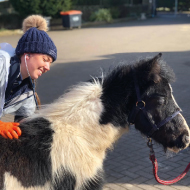Volunteers help over 1,000 UK horses

Volunteers have helped 1,196 UK horses as well as hundreds worldwide. (Image ©BEVA)
The BEVA Trust provides opportunities, support and funding to allow BEVA members to volunteer for projects that enhance equine welfare, both locally and globally. They have helped to make a difference to 1,196 horses in the UK, as well as hundreds of horses around the world.
The Trust and British Horse Society have worked together for the past four years and have run 25 education and welfare castration clinics around the country. So far, 181 BEVA members – together with nurses, student and farriers – have volunteered their time and expertise.
Coordinated by the British Horse Society, and with practical support from a number of other equine welfare charities, the clinics provide dental care, farriery, worming, microchipping and passporting for horses identified to be in need, as well as castration, if required. A total of 547 horses have now been castrated.
The clinics have been generously supported by Zoetis, Bransby, Blue Cross, Redwings, World Horse Welfare and the RSPCA. Also, thanks to a £50,000 grant from South Essex Insurance Brokers, the BHS recently acquired a special healthcare vehicle for use at all future clinics.
Three further education and welfare castration clinics are planned for the autumn of 2019 – in Nottinghamshire, York and Aberdeen.
In addition to this work, BEVA members have been volunteering around the world. This year one vet spent two weeks at the Gambia Horse and Donkey Trust and in April two vets volunteered in Estonia. Upcoming 2019 overseas projects include Lesotho Equine Welfare Clinic in September, Kiev Equine Veterinary Seminar in October and Gambia Horse and Donkey Trust in December.
BEVA members have also been busy raising funds for the Trust. This summer more than 100 vets, vet nurses and other practice team members took part in the BEVA 'Cycle Sportive' – hosted this year by Donnington Grove Equine Vets in Newbury. The event raised £882.



 The RCVS has announced a new version of its 1CPD mobile app, with enhanced features for veterinary surgeons and veterinary nurses to record their continuing professional development.
The RCVS has announced a new version of its 1CPD mobile app, with enhanced features for veterinary surgeons and veterinary nurses to record their continuing professional development.